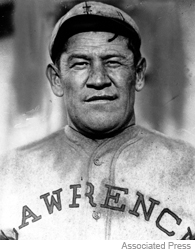Jim Thorpe is acknowledged to be one of the greatest ever all-around athletes, a man who excelled in football, track, baseball and any other sport he attempted. A Sauk and Fox Indian, Thorpe endured discrimination through his life and had his Olympic gold medals taken from him.
Jim Thorpe’s Childhood
James Francis Thorpe was born on May 28, 1887 or 1888, in Sauk and Fox Indian land near Prague, Oklahoma. He was given the name Wa-Tho-Huk, which means “Bright Path.”
His twin brother, Charlie, died when the boys were 9 and his mother, a descendent of Chief Black Hawk, died two years later. His father sent him to boarding schools, from which he would often run away, and in 1904 he was sent to the Carlisle Indian Industrial School in Pennsylvania. That same year, his father died and Jim had nowhere to run home to.
Sources in this Story
- The Official Site of Jim Thorpe: Biography
- Native Villages/Sports Illustrated: The Team That Invented Football
- Sports Illustrated: The Regilding of a Legend
- ESPN: Thorpe preceded Deion, Bo
- The New York Times: Jim Thorpe and a Ticket to Serendipity
- Time: “The Greatest Athlete”
Thorpe’s Athletic Achievements
In 1907, Thorpe tried out for the Carlisle football team, coached by Pop Warner and called the “team that invented football” by Sally Jenkins in her book “The Real All-Americans.” Warner gave Thorpe the ball and told him to run through the defense of approximately 30-40 players; Thorpe did so twice in a row. Warner called it “an exhibition of athletic talent that I had never before witnessed, nor was I ever to again see anything similar.”
In 1912 Thorpe scored 25 touchdowns and led the team to a national championship. During that season, the team played at West Point against an Army team with nine future generals, including Dwight Eisenhower. Thorpe put on his “his greatest performance as a college player,” writes Jenkins, in the Indians’ 27-6 win over the heavily favored Cadets.
Thorpe traveled to Sweden to compete in four track and field events at the 1912 Stockholm Olympics, winning gold in the pentathlon and decathlon. He was given a silver chalice by King Gustav V, who told Thorpe, “Sir, you are the greatest athlete in the world.” Thorpe responded, “Thanks, King.”
He would later be stripped of his medals, however, when a newspaper discovered he was not technically an amateur, having played minor league baseball in 1909 and 1910. (Many collegians of his era also played semi-pro sports, but they did so under false names. Thorpe used his real one.) Thorpe’s medals would be restored to him in 1982, 30 years after his death.
Thorpe went on to play professional baseball and football. As a baseball player for the New York Giants, Cincinnati Reds and Boston Braves, he struggled to hit the curveball and batted .252 over six seasons.
In football, he was the star of the Canton Bulldogs, widely regarded at the time as the best team. In 1920, he was named first president of the American Professional Football Association, which became the NFL two years later. After six years of playing and coaching in the APFA/NFL, Thorpe retired.
Thorpe also played basketball in the late 20s, a fact that wasn’t discovered until 2005, when a man found a ticket in an old book for an exhibition basketball game featuring “Jim Thorpe and His World Famous Indians.”
“He is trying to find his way,” his biographer Bob Reising told The New York Times. “He has lived all these years in the white man’s world, but he has no marketable skills. Consumed by competition, he tries to keep going.”
The Man and His Work
- “Jim Thorpe, Original All-American,” by Joseph Bruchac
- “All American: The Rise and Fall of Jim Thorpe,” by Bill Crawford
- “Carlisle vs. Army: Jim Thorpe, Dwight Eisenhower, Pop Warner, and the Forgotten Story of Football’s Greatest Battle,” by Lars Anderson
- “Jim Thorpe: All American” (DVD)
The Rest of the Story
After his athletic career was over, Thorpe had little to fall back on. He was soon reduced to doing menial labor and developed a drinking problem. His wife divorced him, taking custody of their four sons, as Thorpe bounced from job to job.
He sold the movie rights to his life story for just $1,500; the resulting film, “Jim Thorpe: All-American,” starred Burt Lancaster as Thorpe. In 1951, he was diagnosed with lip cancer and admitted to a Philadelphia hospital as a charity case. He died two years later from a heart attack at the age of 64.
This article was originally written by Denis Cummings; it was updated May 5, 2017.











